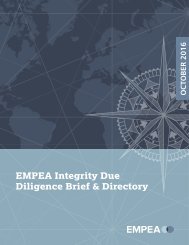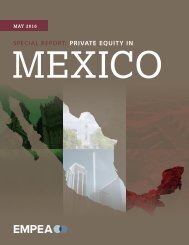You also want an ePaper? Increase the reach of your titles
YUMPU automatically turns print PDFs into web optimized ePapers that Google loves.
6. POTENTIAL AFRICAN<br />
ONSHORE FINANCIAL<br />
CENTRES<br />
As outlined earlier in the paper there is no single factor<br />
which can determine the potential <strong>of</strong> any city to fulfil the<br />
role <strong>of</strong> a financial centre. Furthermore, we have determined<br />
that there are several different types <strong>of</strong> financial centres<br />
and hence policymakers must be precise in their objectives<br />
such that the most appropriate policies can be designed.<br />
In the following table we have tried to <strong>of</strong>fer a ‘general’<br />
comparison <strong>of</strong> different African centres and their potential to<br />
become an important onshore financial centre. We discuss<br />
below why other geographies were not considered.<br />
Table 1 outlines the strength <strong>of</strong> some African cities based<br />
on several characteristics that are important to financial<br />
practitioners (in each category the number <strong>of</strong> stars indicate<br />
a show <strong>of</strong> strength).<br />
We have chosen a number <strong>of</strong> cities as the basis <strong>of</strong><br />
comparison. In each case, we believe there is the potential<br />
to develop or grow the city’s role as a financial centre and<br />
where we believe the city has the potential to serve a<br />
regional role.<br />
Table 1: Comparison <strong>of</strong> African onshore financial centres<br />
Lagos Nairobi Lusaka Accra<br />
Casablanca<br />
<strong>Capital</strong> Markets (a) *** ** * * ***<br />
GDP (b) *** ** * * ***<br />
Financial Market<br />
Institutions (c)<br />
** *** * ** **<br />
Infrastructure (d) ** *** * ** ***<br />
Quality <strong>of</strong> Life (e) * ** *** ** ***<br />
Legal framework (f) * ** ** *** *** 6<br />
Stability (g) * ** *** *** **<br />
Pr<strong>of</strong>essional services (h) *** *** ** ** **<br />
(a) <strong>Capital</strong> Market: based on scoring <strong>of</strong> the African Domestic<br />
Bond Fund Feasibility Report (ADBF Report) from<br />
Concerto Financial Solutions on behalf <strong>of</strong> the African<br />
Development Bank in 2011. To assess <strong>Capital</strong> Markets<br />
we used the study’s score attributed to the Domestic<br />
Investor Base which is based on different measures<br />
<strong>of</strong> total assets held by pension, mutual and insurance<br />
funds. (* 0-15; ** 16-25; *** 26 and above).<br />
(b) GDP: based on country GDP data from IMF 2014<br />
estimates in USD (* 0-50bn; ** 51bn-100bn; *** 101bn<br />
and above).<br />
(c) Financial Market Institutions: based on ADBF Report’s<br />
variable used to score institutions and organisations<br />
relevant to the Financial Markets. The variable is<br />
composed <strong>of</strong> the number <strong>of</strong> institutions that exist to<br />
facilitate financial markets: (*0-50; ** 51-70; *** 70<br />
and above).<br />
(d) Infrastructure: based on number <strong>of</strong> international (also<br />
intra-African) destinations reached directly from a city’s<br />
airport (* 0-20 flights; ** 21-40 flights; *** 41 and above).<br />
(e) Quality <strong>of</strong> Life: based on Mercer Quality <strong>of</strong> Living Survey<br />
2012 Ranking: (* rank 200 or below, ** rank 199-150, ***<br />
rank 149-1).<br />
(f) Legal framework: based on World Bank Governance<br />
Indicators 2013. Scores are based on average <strong>of</strong><br />
percentile achieved in regulatory quality and rule <strong>of</strong> law.<br />
(* 0-20; **21-40; *** 41 and above).<br />
(g) Stability: based on World Bank Governance Indicators<br />
2013. Scores are based on percentile achieved in the<br />
political stability assessment. (* 0-10; ** 11-30; *** 31<br />
and above).<br />
(h) Pr<strong>of</strong>essional services: based on LHGP assessment<br />
on using local expertise in accounting, consulting and<br />
other finance related services.<br />
As we have seen, certain factors are important even if none<br />
<strong>of</strong> them can claim to be sufficient to enable any one city<br />
to accede to the role <strong>of</strong> becoming an important financial<br />
centre. Most <strong>of</strong> these factors have been discussed and their<br />
relative importance has been outlined above. In Table 1, we<br />
have tried to rank certain African cities with respect to their<br />
relative strengths in key areas. From this very high level<br />
analysis, the three centres that <strong>of</strong>fer the greatest potential<br />
would seem to be Lagos, Nairobi and Casablanca. This<br />
analysis can and should be undertaken in greater detail before<br />
specific policy recommendations are made and at the very least<br />
there should be formal engagement with key policymakers and<br />
possible stakeholders.<br />
In the African context, there may be some issues with regional<br />
differences. For example, West African countries may find it<br />
easier to be serviced from an <strong>of</strong>fshore centre such as Mauritius<br />
6<br />
Casablanca is the only destination where the legal system is not based on English law. As most financial centres have legislations based on English<br />
law or at least based on common law, investors may consider Casablanca more challenging from a legal point <strong>of</strong> view than less well rated common law<br />
destinations.<br />
110 |





